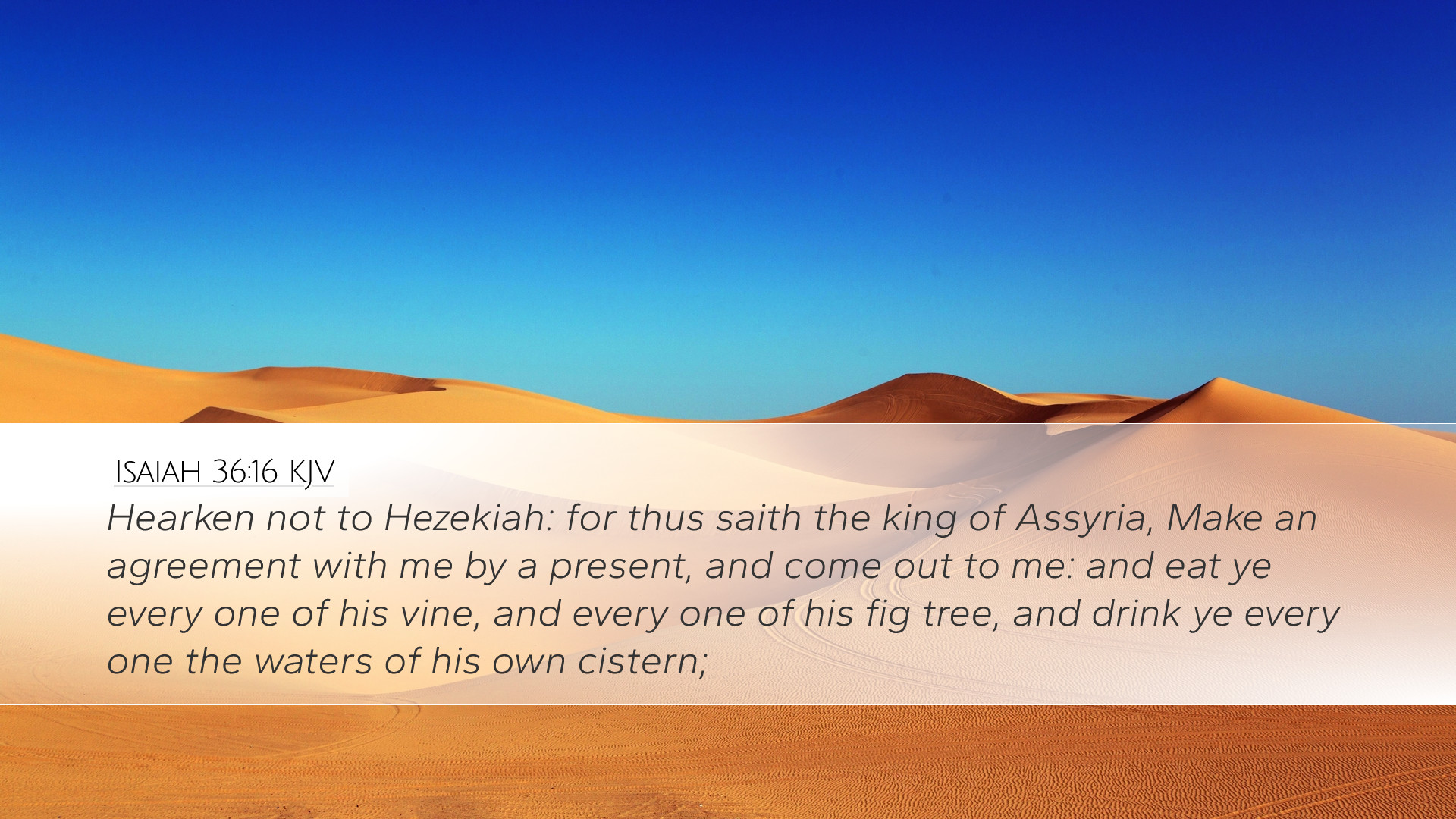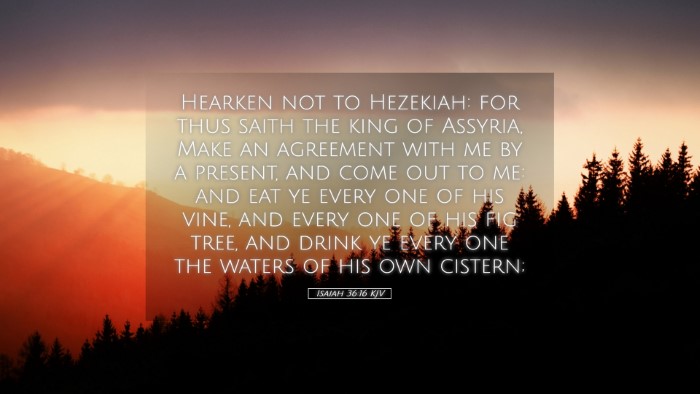Commentary on Isaiah 36:16
Verse Reference: Isaiah 36:16 (KJV) - "Hearken not to Hezekiah: for thus saith the king of Assyria, Make an agreement with me by a present, and come out to me: and eat ye every one of his vine, and every one of his fig tree, and drink ye every one the waters of his own cistern."
Introduction
This verse captures a moment of desperation and challenge during the reign of King Hezekiah of Judah. The envoy from Assyria, presenting the words of King Sennacherib, attempts to undermine the confidence of the people of Judah through persuasive rhetoric. The multifaceted implications of this invitation for surrender are discussed extensively in various public domain commentaries.
Contextual Background
The historical context reveals that Judah was under threat from the Assyrian Empire, renowned for its military might and conquests. King Sennacherib's campaign against Judah was a pivotal episode, marked by intimidation tactics meant to frighten and weaken the resolve of those within Jerusalem. Understanding this background is crucial for interpreting the theological and practical significance of the events described.
The Persuasive Tactics of Assyria
In this verse, the Assyrian king employs several tactics that merit attention:
- Appeal to Self-Interest: The offer to partake of their own crops and water highlights a temptation towards self-preservation and prosperity.
- Minimizing the Threat: By belittling Hezekiah's leadership and resources, the Assyrians aim to create a sense of helplessness among the people.
- Choice and Agency: The invitation hints at voluntary compliance, strategically framing surrender as a wise decision rather than an act of defeat.
Commentary Insights
Matthew Henry's Commentary
Matthew Henry emphasizes the importance of discernment in this verse. He draws attention to the danger of yielding to seemingly attractive offers that may have further implications. In his assessment, Henry notes:
- Hezekiah's faithfulness to God stands in stark contrast to the Assyrian king’s manipulative strategies.
- Henry warns believers to recognize the voice of little faith and fear in voices that tempt them to compromise their spiritual integrity.
Albert Barnes' Commentary
Barnes elaborates on the rhetorical strategies of the Assyrian envoy. He points out that the phrase “Make an agreement with me” signifies a treaty, aimed at fostering an illusion of security:
- He highlights the extensive promises of abundance, which could easily resonate with the people but fail to address the true dependencies on God.
- Barnes also remarks on the significance of the phrase “drink the waters of your own cistern,” stressing the false comfort offered by the Assyrians, which could lead to spiritual desolation.
- He warns against negotiating with the enemy, especially when the enemy's intentions are to undermine one's trust in God.
Adam Clarke's Commentary
Clarke provides a detailed exposition concerning the implications of the stone of stumbling presented by Sennacherib’s envoys:
- He underscores the irony of being invited back to earthly comforts while abandoning divine faithfulness.
- Clarke describes the psychological and spiritual dimensions of this allure, where the powerless fear leads them to surrender their privilege of faith.
- He also expresses that the covenant with Assyria, while appearing beneficial, would ultimately lead to slavery, both physically and spiritually.
Theological Applications
Spiritual Warfare
This scripture serves as a profound reminder of the spiritual warfare that continues today. The strategies employed by the Assyrians find echoes in the temptations faced by believers:
- Temptation of Comfort: Just as the Israelites were enticed to forsake their covenant with God for earthly securities, modern Christians often face similar dilemmas.
- Choice of Allegiance: The verse invites reflection on whom we ultimately place our trust—personal autonomy or divine sovereignty.
Faith and Fear
Isaiah 36:16 challenges individuals and communities of faith to confront the tension between faith and fear. The confidence exhibited by Hezekiah amidst crisis serves as a model of steadfast faith:
- Resisting Manipulation: Pastors and leaders are encouraged to help congregations discern the sources of their fears and refocus them on God’s promises.
- True Dependence on God: The communal response to such threats should involve seeking God earnestly, rather than looking for human solutions.
Conclusion
In summary, the verse Isaiah 36:16 presents a profound opportunity for theological reflection and practical application. The strategies of the Assyrians serve as a warning against compromises made in the face of hardship. The insights from revered commentators like Matthew Henry, Albert Barnes, and Adam Clarke deepen our understanding of not only the historical context but also the ongoing implications for our spiritual journey. In a landscape rife with challenges, may we remain steadfast, refusing to be swayed by voices that invite us away from complete reliance on God.


